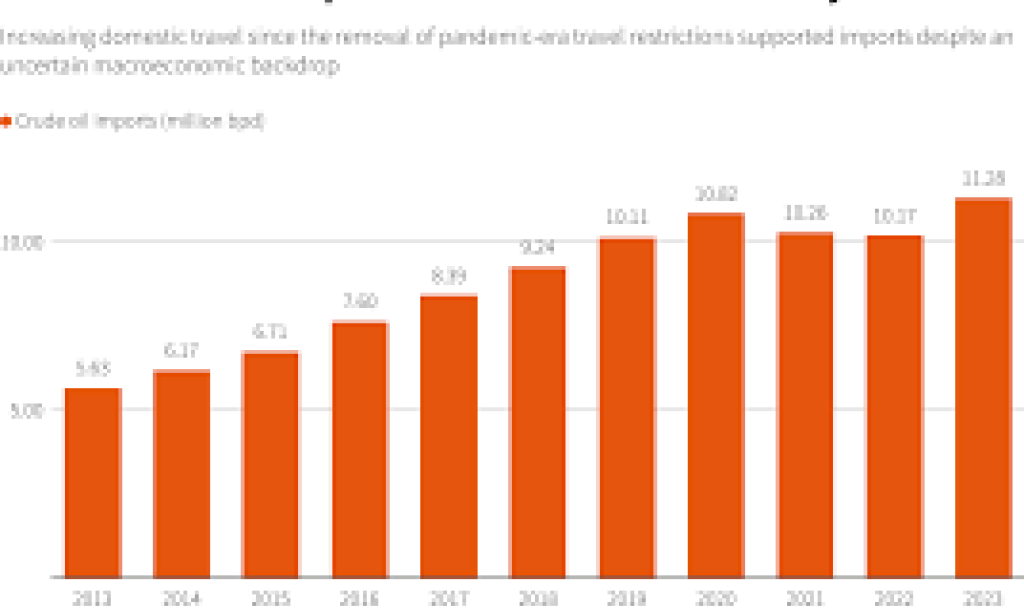China's 2023 Crude Oil Imports Hit Record as Fuel Demand Recovers
China, the world’s largest importer of crude oil, saw its imports hit a record high in 2023. This surge was driven by recovering fuel demand as the country’s economy rebounded after easing COVID-19 restrictions. Let’s explore what caused this increase, its global impact, and what it means for the future.
Record-Breaking Crude Oil Imports
In 2023, China imported an average of 13.4 million barrels of oil per day, marking the highest level in its history. This is a significant jump compared to the previous year when COVID-19 restrictions dampened demand. The total annual imports surpassed 540 million tons, highlighting the rapid recovery of fuel consumption in industries and households.
Reasons Behind the Surge
-
Economic Recovery:
After lifting its strict COVID-19 policies, China’s economy experienced a strong rebound. Factories resumed operations, transportation activity increased, and consumer spending rose—all of which boosted oil demand. -
Increased Refinery Capacity:
Chinese refineries expanded their production capacity in 2023. This allowed them to process more crude oil into products like gasoline, diesel, and jet fuel. -
Stockpiling Strategy:
With oil prices fluctuating, China took advantage of lower prices earlier in the year to build up its strategic reserves. This not only ensured energy security but also stabilized its supply chain. -
Growing Exports of Refined Products:
China increased its exports of refined fuels to neighboring countries, contributing to the higher import of crude oil to meet both domestic and international demand.
Impact on the Global Oil Market
-
Higher Demand Supports Oil Prices:
China’s record imports helped stabilize global oil prices, especially when demand in other parts of the world, such as Europe, remained weak. -
Pressure on Oil Suppliers:
Major oil-exporting countries like Saudi Arabia and Russia benefited from higher Chinese imports. However, competition among suppliers also intensified as they sought to maintain or grow their market share in China.
Influence on Global Energy Policies:
China’s growing reliance on crude oil has raised questions about global energy sustainability. It has also highlighted the importance of diversifying energy sources to reduce dependency on fossil fuels.
What This Means for China’s Economy
-
Boost to Domestic Industries:
The availability of crude oil supports industries like manufacturing, transportation, and construction, which are key to China’s economic growth. -
Challenges in Managing Energy Transition:
While oil imports are essential for China’s energy needs, the country is also trying to reduce its carbon footprint. Balancing economic growth with environmental goals remains a significant challenge. -
Vulnerability to Global Market Shifts:
Heavy reliance on imported crude oil makes China vulnerable to price fluctuations and geopolitical tensions that could disrupt supply chains.
Future Outlook
-
Continued Growth in Energy Demand:
As China’s economy continues to grow, its demand for crude oil is expected to remain strong. However, the pace of growth may slow as the country invests more in renewable energy sources. -
Shift Towards Green Energy:
China has committed to reaching carbon neutrality by 2060. This will require a gradual reduction in fossil fuel use and an increase in investments in wind, solar, and electric vehicle technologies.
Global Collaboration:
China’s role in the global energy market will remain critical. Collaboration with oil-exporting countries and participation in international climate initiatives will shape its energy policies in the years to come.
Conclusion
China’s record crude oil imports in 2023 reflect its strong economic recovery and growing energy needs. While this surge has supported global oil markets, it also highlights challenges like environmental sustainability and market dependence. As China looks to balance economic growth with its green energy goals, its actions will have a lasting impact on the global energy landscape.



You must be logged in to post a comment.